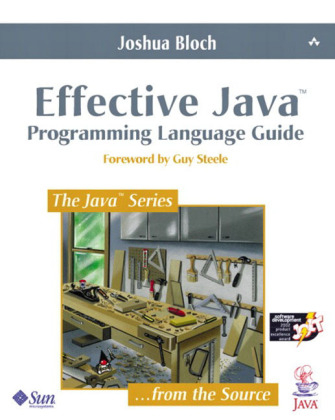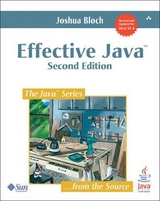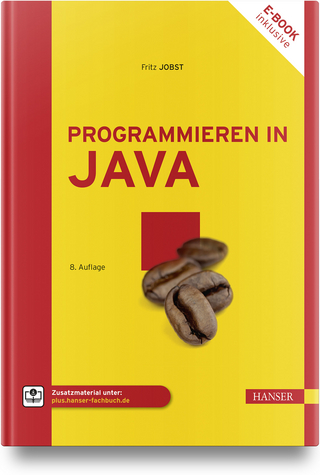
Effective Java™ Programming Language Guide
Addison Wesley (Verlag)
978-0-201-31005-4 (ISBN)
- Titel erscheint in neuer Auflage
- Artikel merken
Joshua Bloch is a principal engineer at Google and a Jolt Award-winner. He was previously a distinguished engineer at Sun Microsystems and a senior systems designer at Transarc. Josh led the design and implementation of numerous Java platform features, including JDK 5.0 language enhancements and the award-winning Java Collections Framework. He holds a Ph.D. in computer science from Carnegie Mellon University.
Foreword.
Preface.
Acknowledgements.
1. Introduction.
2. Creating and Destroying Objects.
Consider Providing Static Factory Methods Instead of Constructors.
Enforce the Singleton Property with a Private Constructor.
Enforce Noninstantiability with a Private Constructor.
Avoid Creating Duplicate Objects.
Eliminate Obsolete Object References.
Avoid Finalizers.
3. Methods Common to All Objects.
Obey the General Contract when Overriding Equals.
Always Override HashCode When You Override Equals.
Always Override to String.
Override Clone Judiciously.
Consider Implementing Comparable.
4. Classes and Interfaces.
Minimize the Accessibility of Classes and Members.
Favor Immutability.
Favor Composition Over Inheritance.
Design and Document for Inheritance or Else Prohibit It.
Prefer Interfaces to Abstract Classes.
Use Interfaces Only to Define Types.
Favor Static Member Classes Over Non-Static.
5. Substitutes for C Constructs.
Replace Structures with Classes.
Replace Unions with Class Hierarchies.
Replace Enums with Classes.
Replace Function Pointers with Classes and Interfaces.
6. Methods.
Check Parameters for Validity.
Make Defensive Copies when Needed.
Design Method Signatures Carefully.
Use Overloading Judiciously.
Return Zero-Length Arrays, Not Nulls.
Write Doc Comments for All Exposed API Elements.
7. General Programming.
Minimize the Scope of Local Variables.
Know and Use the Libraries.
Avoid Float and Double if Exact Answers are Required.
Avoid Strings where Other Types are More Appropriate.
Beware the Performance of String Concatenation.
Refer to Objects by their Interfaces.
Prefer Interfaces to Reflection.
Use Native Methods Judiciously.
Optimize Judiciously.
Adhere to Generally Accepted Naming Conventions.
8. Exceptions.
Use Exceptions Only for Exceptional Conditions.
Use Checked Exceptions for Recoverable Conditions, Runtime Exceptions for Programming Errors.
Avoid Unnecessary Use of Checked Exceptions.
Favor the Use of Standard Exceptions.
Throw Exceptions Appropriate to the Abstraction.
Document All Exceptions Thrown by Each Method.
Include Failure-Capture Information in Detail Messages.
Strive for Failure Atomicity.
Don't Ignore Exceptions.
9. Threads.
Synchronize Access to Shared Mutable Data.
Avoid Excessive Synchronization.
Never Invoke Wait Outside a Loop.
Don't Depend on the Thread Scheduler.
Document Thread-Safety.
Avoid Thread Groups.
10. Serialization.
Implement Serializable Judiciously.
Consider Using a Custom Serialized Form.
Write ReadObject Methods Defensively.
Provide a ReadResolve Method when Necessary.
References.
Index.
| Erscheint lt. Verlag | 13.6.2001 |
|---|---|
| Reihe/Serie | The Java Series ... from the Source |
| Verlagsort | Boston |
| Sprache | englisch |
| Gewicht | 540 g |
| Themenwelt | Informatik ► Programmiersprachen / -werkzeuge ► Java |
| Mathematik / Informatik ► Informatik ► Web / Internet | |
| ISBN-10 | 0-201-31005-8 / 0201310058 |
| ISBN-13 | 978-0-201-31005-4 / 9780201310054 |
| Zustand | Neuware |
| Informationen gemäß Produktsicherheitsverordnung (GPSR) | |
| Haben Sie eine Frage zum Produkt? |
aus dem Bereich



